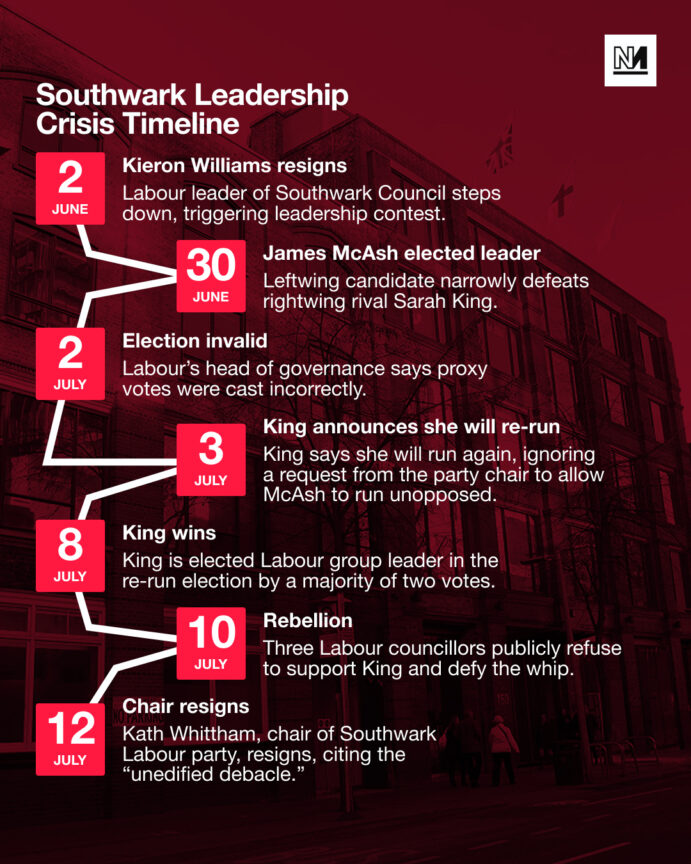How Labour ‘Rigged’ an Election to Block a Leftwinger From Leading a Council
Anatomy of ‘an unedified debacle’.
by Polly Smythe
17 July 2025

The Labour party faces allegations that it rigged an election in order to block a leftwing candidate from leading a council, leaving a local party branch in uproar.
The increasingly bitter row centres on a complaint made by Bermondsey and Rotherhithe MP Neil Coyle, who claimed that the election of leftwing candidate James McAsh as the Labour leader of London’s Southwark council was invalid.
On 2 June, then Labour council leader Kieron Williams made the surprise announcement that he was standing down.
An election for a new leader was held on 30 June, where McAsh was voted chair of the Labour Southwark group, narrowly defeating rightwing candidate Sarah King – a partner at Connect Communications, a lobbying firm run by former Labour MP Andy Sawford, whose clients include property developers Berkeley and One Housing Group.
But his victory was short-lived, after the central Labour party demanded that his election be overturned, with Coyle raising objections over the use of proxy voting in the election.
While Coyle told Southwark News that McAsh would “not have been his first choice as leader”, he maintained to the paper that his objection to his election was purely administrative.
However, it wouldn’t be the first time that Labour party bureaucracy was used to block a leftwing candidate, with the parliamentary selection process for the 2024 general election dominated by allegations of stitch-ups and the bypassing of democratic processes for factional ends.
Coyle, a member of the party’s rightwing, was a strident critic of Corbyn. In 2020, his texts to the then Labour leader were revealed: “I have no idea how you sleep at night but I hope … it’s really badly,” and “you make me ashamed to have ever tried to work with you.”
In 2023, Coyle was suspended from the Labour party for five days, following incidents of “drunken abuse” and “racist comments”. Coyle apologised and said he would “take the punishment on the chin”.
McAsh, who had already resigned from his job as a primary school teacher to lead the council, discovered that the election had been overturned not from the Labour party, but after being contacted by a Southwark News reporter.
Accessibility provisions used as a ‘factional weapon’.
On 2 July, Labour’s head of governance Dominic Collins wrote to the Southwark Labour group, informing members that the election would be re-run, following a review conducted by the party’s governance and legal unit over the use of proxy votes.
Collins cited a supposed ambiguity in the standing orders – the rules governing conduct – around the use of proxy votes, despite the fact that the Labour group secretary had confirmed in two separate emails detailing the election timeline that proxy votes would be allowed.
Two regional party officers had even attended the initial election, and raised no objection on the night.
Additionally, the two councillors who requested proxy votes – Ketzia Harper and Laura Johnson – both had their requests approved by Labour group chief whip Maggie Browning, with the Southwark Labour group chair and group secretary copied into the confirmation emails.
Harper needed to use a proxy vote as she is managing a long term illness. Johnson, a single mother, had a holiday booked and would have incurred significant financial costs to attend the meeting in person had she not used a proxy vote.
Harper contacted Collins, asking him to clarify why her proxy vote request was accepted initially, if in the region’s view it was not valid. Collins did not respond.
Harper told Novara Media: “Instead of respecting the results of the fair election of a leftwing council leader, the Labour party intervened, at the behest of Neil Coyle, to stage a rigged one to secure their preferred candidate.
“In doing so, and without hesitation, Labour used the accessibility provisions for a disabled councillor and single mum as a factional weapon, showing that they don’t care about accessibility or inclusion at all.
“The Labour party has revealed its internal democracy to be a sham, undermining its credibility as an organisation and consequently trust in its ability to govern.”
Despite this, Collins said that there was “no alternative but to re-run the election to ensure that the group and the party can have confidence in the outcome”.
Collins ordered the council to conduct a re-run using Labour’s online Anonyvoter voting system, which came in for intense criticism when it was used for candidate selection in the build up to the 2024 general election.

‘Painstaking and scrupulously fair.’
Responding to the shock second ballot, Southwark Labour chair Kath Whittam emailed all group members on 2 July saying she had received no complaints about the initial ballot which had been “painstaking and scrupulously fair for all participants including the two persons not in the room who had proxy votes.
“Imagine my surprise when the next morning I received a phone call from someone who was not part of the process, was not involved at any stage of the election, and who was not in the room when the votes were counted”, she wrote. “Neil Coyle MP objected to the result […] and by tea time I was told that our process was invalid.”
When a second ballot was run, four of the candidates who stood at the first election chose not to run, in order to give McAsh a clear run so that he would win.
The only other candidate was King. In an email sent to Labour group members, King wrote: “We were all shocked about the decision that London region made about the election process” but added that she was running anyway as “I still believe that my skills and record make me the best person to lead Southwark Labour and Southwark Council as we face the difficult decisions ahead.”
At the second election on 8 July, King was elected by a majority of two votes.
The following day, McAsh emailed group members that he did “not have faith in the results that we were sent yesterday”.
“Last Monday, we watched the Labour party official hold a ballot box in the air, open it up, and turn it upside down, proving it was empty. We then watched as 52 ballots were handed out, and 52 ballots were placed in this box. The candidates, group officers, and LGC observers then watched as the box was emptied, and the 52 ballots were counted. I was declared the winner.
“This week, we were sent a link to an Anonyvoter poll. The next day, we were sent a PDF declaring the number of votes cast for each candidate. We are told that these are the results of the same poll we voted in, but there is no evidence that it was.”
McAsh adds that both him and King requested Anonyvoter be replaced by a paper ballot, and that he requested observers be added to the Anonyvoter poll, neither of which was heeded.
Two days later, as King was formally voted in as the next leader of Southwark council, Harper, Johnson and councillor Sam Foster defied the Labour whip to vote against her leadership.
‘An unedified debacle.’
Last week, Whittam announced her resignation from the party after what she called “40 years of unwavering Labour party membership” as she could “not be convinced” that the first leadership election had not been “fair, transparent and legal”.
Calling the second election an “unedified debacle,” Whittam said that she was “not sorry to be leaving behind people whose only aim is to gain power.”
A Labour party spokesperson said: “This ballot had to be re-run after it was established votes had been cast which were ineligible under local party rules.”
Neil Coyle MP said: “The administrative hiccup in the Southwark Labour Group has been addressed and the council has an excellent new leader – the first woman leader of the council for over two decades.
“The standing orders for the Labour group are not a matter of secrecy. They were not followed in the first ballot despite being highlighted in advance of the meeting by councillors.
“Multiple complaints about the group’s failure to follow standing orders were made and a new ballot held. The party was right to ensure rules are followed; as we all expect.”
Polly Smythe is Novara Media’s labour movement correspondent.


